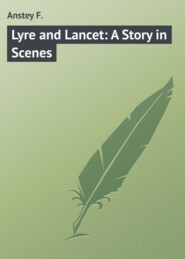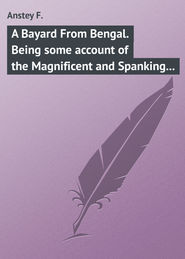По всем вопросам обращайтесь на: info@litportal.ru
(©) 2003-2024.
✖
The Black Poodle, and Other Tales
Настройки чтения
Размер шрифта
Высота строк
Поля
And so strong was my feeling about this from the very first, that I doubt whether, if McFadden's terms had been a shade less liberal, I could ever have brought myself to consent.
But it struck me that, under judiciously sympathetic treatment, the lady might prove not inconsolable, and that I myself might be able to heal the wound I was about to inflict.
I found a subtle pleasure in the thought of this, for, unless McFadden had misinformed me, Chlorine's fortune was considerable, and did not depend upon any marriage she might or might not make. On the other hand, I was penniless, and it seemed to me only too likely that her parents might seek to found some objection to me on that ground.
I studied the photograph McFadden had left with me; it was that of a pensive but distinctly pretty face, with an absence of firmness in it that betrayed a plastic nature. I felt certain that if I only had the recommendation, as McFadden had, of an aunt's dying wishes, it would not take me long to effect a complete conquest.
And then, as naturally as possible, came the thought – why should not I procure myself the advantages of this recommendation? Nothing could be easier; I had merely to present myself as Augustus McFadden, who was hitherto a mere name to them; the information I already possessed as to his past life would enable me to support the character, and as it seemed that the baronet lived in great seclusion, I could easily contrive to keep out of the way of the few friends and relations I had in London until my position was secure.
What harm would this innocent deception do to anyone? McFadden, even if he ever knew, would have no right to complain – he had given up all pretentions himself and if he was merely anxious to preserve his reputation, his wishes would be more than carried out, for I flattered myself that whatever ideal Chlorine might have formed of her destined suitor, I should come much nearer to it than poor McFadden could ever have done. No, he would gain, positively gain, by my assumption. He could not have counted upon arousing more than a mild regret as it was; now he would be fondly, it might be madly, loved. By proxy, it is true, but that was far more than he deserved.
Chlorine was not injured – far from it; she would have a suitor to welcome, not weep over, and his mere surname could make no possible difference to her. And lastly, it was a distinct benefit to me, for with a new name and an excellent reputation success would be an absolute certainty. What wonder, then, that the scheme, which opened out a far more manly and honourable means of obtaining a livelihood than any I had previously contemplated, should have grown more attractively feasible each day, until I resolved at last to carry it out? Let rigid moralists blame me if they will; I have never pretended to be better than the average run of mankind (though I am certainly no worse), and no one who really knows what human nature is will reproach me very keenly for obeying what was almost an instinct. And I may say this, that if ever an unfortunate man was bitterly punished for a fraud which was harmless, if not actually pious, by a visitation of intense and protracted terror, that person was I!
II
After arriving in England, and before presenting myself at Parson's Green in my assumed character, I took one precaution against any danger there might be of my throwing away my liberty in a fit of youthful impulsiveness. I went to Somerset House, and carefully examined the probate copy of the late Miss Petronia McFadden's last will and testament.
Nothing could have been more satisfactory; a sum of between forty and fifty thousand pounds was Chlorine's unconditionally, just as McFadden had said. I searched, but could find nothing in the will whatever to prevent her property, under the then existing state of the law, from passing under the entire control of a future husband.
After this, then, I could no longer restrain my ardour, and so, one foggy afternoon about the middle of December, I found myself driving towards the house in which I reckoned upon achieving a comfortable independence.
Parson's Green was reached at last; a small triangular open space bordered on two of its sides by mean and modern erections, but on the third by some ancient mansions, gloomy and neglected-looking indeed, but with traces on them still of their former consequence.
My cab stopped before the gloomiest of them all – a square grim house with dull and small-paned windows, flanked by two narrow and projecting wings, and built of dingy brick, faced with yellow-stone. Some old scroll-work railings, with a corroded frame in the middle for a long departed oil-lamp, separated the house from the road; inside was a semicircular patch of rank grass, and a damp gravel sweep led from the heavy gate to a square portico supported by two wasted black wooden pillars.
As I stood there, after pulling the pear-shaped bell-handle, and heard the bell tinkling and jangling fretfully within, and as I glanced up at the dull house-front looming cheerless out of the fog-laden December twilight, I felt my confidence beginning to abandon me for the first time, and I really was almost inclined to give the whole thing up and run away.
Before I could make up my mind, a mouldy and melancholy butler had come slowly down the sweep and opened the gate – and my opportunity had fled. Later I remembered how, as I walked along the gravel, a wild and wailing scream pierced the heavy silence – it seemed at once a lamentation and a warning. But as the District Railway was quite near, I did not attach any particular importance to the sound at the time.
I followed the butler through a dank and chilly hall, where an antique lamp hung glimmering feebly through its panes of dusty stained glass, up a broad carved staircase, and along some tortuous panelled passages, until at length I was ushered into a long and rather low reception room, scantily furnished with the tarnished mirrors and spindle-legged brocaded furniture of a bygone century.
A tall and meagre old man, with a long white beard, and haggard, sunken black eyes, was seated at one side of the high chimney-piece, while opposite him sat a little limp old lady with a nervous expression, and dressed in trailing black robes relieved by a little yellow lace about the head and throat. As I saw them, I recognised at once that I was in the presence of Sir Paul Catafalque and his wife.
They both rose slowly, and advanced arm-in-arm in their old-fashioned way, and met me with a stately solemnity. 'You are indeed welcome,' they said in faint hollow voices. 'We thank you for this proof of your chivalry and devotion. It cannot be but that such courage and such self-sacrifice will meet with their reward!'
And although I did not quite understand how they could have discerned, as yet, that I was chivalrous and devoted, I was too glad to have made a good impression to do anything but beg them not to mention it.
And then a slender figure, with a drooping head, a wan face, and large sad eyes, came softly down the dimly-lighted room towards me, and I and my destined bride met for the first time.
As I had expected, after she had once anxiously raised her eyes, and allowed them to rest upon me, her face was lighted up by an evident relief, as she discovered that the fulfilment of my aunt's wishes would not be so distasteful to her, personally, as it might have been.
For myself, I was upon the whole rather disappointed in her; the portrait had flattered her considerably – the real Chlorine was thinner and paler than I had been led to anticipate, while there was a settled melancholy in her manner which I felt would prevent her from being an exhilarating companion.
And I must say I prefer a touch of archness and animation in womankind, and, if I had been free to consult my own tastes, should have greatly preferred to become a member of a more cheerful family. Under the circumstances, however, I was not entitled to be too particular, and I put up with it.
From the moment of my arrival I fell easily and naturally into the position of an honoured guest, who might be expected in time to form nearer and dearer relations with the family, and certainly I was afforded every opportunity of doing so.
I made no mistakes, for the diligence with which I had got up McFadden's antecedents enabled me to give perfectly satisfactory replies to most of the few allusions or questions that were addressed to me, and I drew upon my imagination for the rest.
But those days I spent in the baronet's family were far from lively: the Catafalques went nowhere; they seemed to know nobody; at least no visitors ever called or dined there while I was with them, and the time dragged slowly on in a terrible monotony in that dim tomb of a house, which I was not expected to leave except for very brief periods, for Sir Paul would grow uneasy if I walked out alone – even to Putney.
There was something, indeed, about the attitude of both the old people towards myself which I could only consider as extremely puzzling. They would follow me about with a jealous care, blended with anxious alarm, and their faces as they looked at me wore an expression of tearful admiration, touched with something of pity, as for some youthful martyr; at times, too, they spoke of the gratitude they felt, and professed a determined hopefulness as to my ultimate success.
Now I was well aware that this is not the ordinary bearing of the parents of an heiress to a suitor who, however deserving in other respects, is both obscure and penniless, and the only way in which I could account for it was by the supposition that there was some latent defect in Chlorine's temper or constitution, which entitled the man who won her to commiseration, and which would also explain their evident anxiety to get her off their hands.
But although anything of this kind would be, of course, a drawback, I felt that forty or fifty thousand pounds would be a fair set-off – and I could not expect everything.
When the time came at which I felt that I could safely speak to Chlorine of what lay nearest my heart, I found an unforeseen difficulty in bringing her to confess that she reciprocated my passion.
She seemed to shrink unaccountably from speaking the word which gave me the right to claim her, confessing that she dreaded it not for her own sake, but for mine alone, which struck me as an unpleasantly morbid trait in so young a girl.
Again and again I protested that I was willing to run all risks – as I was – and again and again she resisted, though always more faintly, until at last my efforts were successful, and I forced from her lips the assent which was of so much importance to me.
But it cost her a great effort, and I believe she even swooned immediately afterwards; but this is only conjecture, as I lost no time in seeking Sir Paul and clenching the matter before Chlorine had time to retract.
He heard what I had to tell him with a strange light of triumph and relief in his weary eyes. 'You have made an old man very happy and hopeful,' he said. 'I ought, even now to deter you, but I am too selfish for that. And you are young and brave and ardent; why need we despair? I suppose,' he added, looking keenly at me, 'you would prefer as little delay as possible?'
'I should indeed,' I replied. I was pleased, for I had not expected to find him so sensible as that.
'Then leave all preliminaries to me; when the day and time have been settled, I will let you know. As you are aware, it will be necessary to have your signature to this document; and here, my boy, I must in conscience warn you solemnly that by signing you make your decision irrevocable —irrevocable, you understand?'
When I had heard this, I need scarcely say that I was all eagerness to sign; so great was my haste that I did not even try to decipher the somewhat crabbed and antiquated writing in which the terms of the agreement were set out.
I was anxious to impress the baronet with a sense of my gentlemanly feeling and the confidence I had in him, while I naturally presumed that, since the contract was binding upon me, the baronet would, as a man of honour, hold it equally conclusive on his own side.
As I look back upon it now, it seems simply extraordinary that I should have been so easily satisfied, have taken so little pains to find out the exact position in which I was placing myself; but, with the ingenuous confidence of youth, I fell an easy victim, as I was to realise later with terrible enlightenment.
'Say nothing of this to Chlorine,' said Sir Paul, as I handed him the document signed, 'until the final arrangements are made; it will only distress her unnecessarily.'
I wondered why at the time, but I promised to obey, supposing that he knew best, and for some days after that I made no mention to Chlorine of the approaching day which was to witness our union.
As we were continually together, I began to regard her with an esteem which I had not thought possible at first. Her looks improved considerably under the influence of happiness, and I found she could converse intelligently enough upon several topics, and did not bore me nearly as much as I was fully prepared for.
And so the time passed less heavily, until one afternoon the baronet took me aside mysteriously. 'Prepare yourself, Augustus' (they had all learned to call me Augustus), he said; 'all is arranged. The event upon which our dearest hopes depend is fixed for to-morrow – in the Grey Chamber of course, and at midnight.'
I thought this a curious time and place for the ceremony, but I had divined his eccentric passion for privacy and retirement, and only imagined that he had procured some very special form of licence.
'But you do not know the Grey Chamber,' he added. 'Come with me, and I will show you where it is.' And he led me up the broad staircase, and, stopping at the end of a passage before an immense door covered with black baize and studded with brass nails, which gave it a hideous resemblance to a gigantic coffin lid, he pressed a spring, and it fell slowly back.
I saw a long dim gallery, whose very existence nothing in the external appearance of the mansion had led me to suspect; it led to a heavy oaken door with cumbrous plates and fastenings of metal.
'To-morrow night is Christmas Eve, as you are doubtless aware,' he said in a hushed voice. 'At twelve, then, you will present yourself at yonder door – the door of the Grey Chamber – where you must fulfil the engagement you have made.'
I was surprised at his choosing such a place for the ceremony; it would have been more cheerful in the long drawing room; but it was evidently a whim of his, and I was too happy to think of opposing it. I hastened at once to Chlorine, with her father's sanction, and told her that the crowning moment of both our lives was fixed at last.
The effect of my announcement was astonishing: she fainted, for which I remonstrated with her as soon as she came to herself. 'Such extreme sensitiveness, my love,' I could not help saying, 'may be highly creditable to your sense of maidenly propriety, but allow me to say that I can scarcely regard it as a compliment.'
'Augustus,' she said, 'you must not think I doubt you; and yet – and yet – the ordeal will be a severe one for you.'











